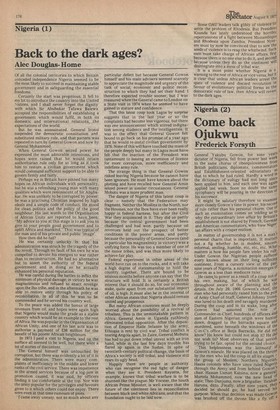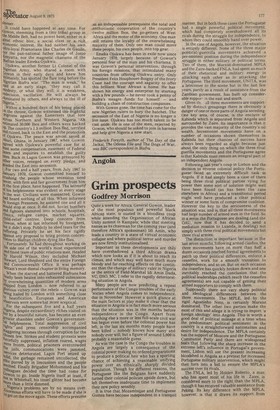Nigeria (2)
Come back Ojukwu
Frederick Forsyth
General Yakubu Gowon, for nine years dictator of Nigeria, fell from power last wee'
to the same chorus of obsequiousness front
British politicians, diplomats, commentators and Establishment-oriented editorialists as
that to which he had ruled. Hardly a word in the dictionary of eulogy had not long since been applied to him, and each one was again applied last week. Soon no doubt the sante, sycophancy will be pouring in the direction or his successor. It might be salutary therefore to examine More closely Gowon's time in power, his rec0rd. of rule rather than his personal charm. Out ot such an examination comes an inkling as to why the extraordinary love affair by Britain's
establishment is not shared by French, German and American commentators, who €ew Nigerian affairs with a crisper realism.
In matter of governorship it is not a man's personal charm that is important. It matters not a fig whether he is modest, sincere;
informal, smiling, humble, etc, etc, etc. What matters is how his people fare under his rule. Under Gowon the Nigerian people suffered every known abuse on their long suffering, continent. From a cursory view of the past` nine years of Nigeria, a summation emerges 0' Gowon as a less than mediocre ruler. He came,to power as a result of a coup not of his own making, but of which he was
throughout aware of the planning and the details. On July 29, 1966 Gowon's chief, the man who had personally raised him to the poSt
of Army Chief-of-Staff, General Johnny Ironsi, was lured to his death and savagely murdered. During the coup and in its wake, long after. Gowon had assumed the role of,. Commander-in-Chief, hundreds of officers and men of Eastern Nigerian origin were hunted down, dragged to the barracks square and murdered, some beneath the windows of the C-in-C's office at Ikeja Barracks, He did not, know? He knew but could not stop it? He did not wish to? Most observers of that period, trying to be fair, opted for the second choice. This helplessness was the leitmotif eIf Gowon's misrule. He was placed on the throne by the men who led, the coup in all its stages the group of Moslem, Northern Nigerian, Hausa colonels who have since ruled Nigeria
through the Army and from behind Gowon's
chair. Hassan Usman Katsina, now a general-; Murtela Mohammed, now the new head o'
state; Theo Danjuma, now a brigadier; Ibrahiin
Haruna, ditto. Finally, after nine years, theY decided he should go; he had served his purpose. When that decision was made Gown° was brushed off the throne like a fly off a
dresser.
It could have happened at any time. For Gowon, stemming from a tiny tribal group in the Middle Belt, had no power base, either in a great ethnic bloc, a social class or a rich economic interest. He had neither his own ultra-loyal Praetorians like Charles de Gaulle, or the pan-national father image of Jomo Nenyatta, nor the magnetic charisma of the Biafran leader Emeka Ojukwu. Ojukwu, another former Lt Colonel of the Nigerian Army, who shared a room with Guwon in their early days and knew him
intimately, has spotted the flaw long before the Nigerian Biafra war. "The man is weak," he said at an early stage, -they may call it modesty, or what they will; it is weakness, Indecision, vacillation. . He will always be dominated by others, and always to the ill of Nigeria."
Within a hundred days of his being placed pn the throne, Gowon witnessed the frightful Pogroms against the Easterners that tore
across Northern and Western Nigeria. Ah estimated 30,000 Ibos and others were hacked P. The country's 1.5 million Ibos fled, terrified and ruined, back to the East and the protection o„f, Ojukwu. The peace was amost saved at 'Dud, Ghana, in January 1967, when Gowon
,greed with Ojukwu's powerful case for at 'east some compensation, easement of Federal taxes and inquiries to establish the guilty ones, Back in Lagos Gowon was pressured by Other voices, reneged on every pledge, and goaded the East into secession.
For two and a half years, from July 1967 to January 1970, Gowon committed himself to
erfishing the people whose secession need !lever, with firm and fair government from him In the first place, have happened. The leitmotif °t. his helplessness was evident at every stage 1,11 the war. Civilians were massacred. Gowon „nad heard nothing of all this. When informed
°Y foreign Pressmen, he assured one and all it kwld stop at once. It did not. Soviet bombers and fighters slammed into schools, hospitals,
clinics, refugee camps, market squares, ershild-relief centres. Deep concern from „"owon, when at last informed by foreigners, 'Alt it didn't stop. Publicly he shed tears for the suffering. Privately he set his face rigidly against any proposal to bring protein-concentrates to Biafran children dying like flies.
Fortunately-,-Ee—Fiiid throughout working on nis side one of the world's most experienced ,aild finest team of public relations men. Headed
°Y Harold Wilson, they included Michael Stewart, Lord Shepherd and the entire Foreign and Commonwealth Office. It was perhaps
liritain's most dismal chapter in living memory.
• When the starved and battered Biafrans had been beaten into exhausted submission °Y overwhelming quantities of modern arms Shipped from London — now referred to as glorious victory over the rebels — Gowon was
to hailed by London with something close `°, beatification. European and American Observers were somewhat more sceptical. „For the subsequent five and a half years L'Ilgeria, despite extraordinary riches visited on
'ler by a bountiful nature, has become an even
greater shambles under Gowon's governmenta.l helplessness. Total suppression of civil rlghts and press censorship accompanied st,aggering incomes through corruption for the ,enosen few. Strikes and student protests were forcefully suppressed, inflation roared, wages ere frozen, political prisoners overcrowded `Ile jails, communications were jammed,
services deteriorated, Lagos Port seized up
the garbage remained uncollected, the Ite purred by in limousines and the people rethed. Finally Brigadier Mohammed and his ,..,`°11eagues decided the time had come for rWon to go. Inside Nigeria itself at least, if ",°t in Whitehall, his tinsel glitter had become "lo_re than a little dimmed. Nigeria's problems. are by no means over. ,c-tiormous efforts will have to be made if she is '0 get on the move again. These efforts presume
as an indispensable prerequisite the total and 'enthusiastic cooperation of the country's 'twelve million Ibos, the go-getters of West ,Africa and the motor of the economy. One man :still retains the loyalty of the overwhelming majority of them. Only one man could move these people, his own people, into top gear. • Emeka Ojukwu has been in exile now since January 1970, largely because of Gowon's personal fear of the man and his charisma. It was Gowon's personal intervention, through his foreign missions, that intimidated many countries from offering Ojukwu entry. Only President Felix Houphouet-Boigny of the Ivory Coast had the courage and sagacity to offer this brilliant West African a home. He has shown his energy and enterprise by starting With a few pounds — he never took a penny of Biafra's meagre funds for himself — and building a chain of construction companies.
With Gowon gone, the time has come for the new Nigerian rulers to bury the hatchet. The secession of the East of Nigeria is no longer a live issue. Ojukwu has too much talent to be cast aside. He is one of the men, rejected by Gowon, who should be asked to join in harness and help give Nigeria a new start.
Frederick Forsyth, author of The Day of the Jackal, The Odessa File and The Dogs of War, was BBC correspondent in Biafra



































 Previous page
Previous page